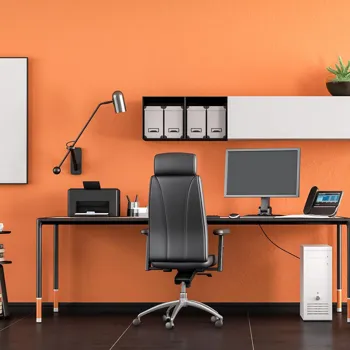Boost Your Well-being with 10 Office Health Tips" Dive into easy changes for a healthier, happier office environment
In today's fast-paced world, most of us spend a significant chunk of our lives within
the four walls of an office.
Whether you're crunching numbers, developing cutting-edge technology, or crafting compelling marketing campaigns, your office environment has a direct impact on your overall well-being and productivity.
It's not just about the fancy coffee machine or the vibrant décor; it's about creating a space that supports your physical and mental health. So, let's dive into ten actionable tips to transform your office into a haven of well-being.
Implementing these simple changes can make a world of difference to your day-to-day experience at work, making you feel more energized, focused, and happy. A healthier office means a healthier and more productive you.
Air Quality Matters: Breathe Easy
Let's face it, poor air quality can turn your office into a breeding ground for fatigue, headaches, and even allergies. Regularly opening windows, even for a short period, can work wonders. Bringing in air-purifying plants like snake plants or spider plants are known to filter out airborne toxins.
Also, ensure that the office's ventilation system is properly maintained and cleaned regularly. Consider using an air purifier especially if you are in an area with high pollution levels. Dust and clean your workspace frequently to prevent dust build-up.
A clean working environment leads to clearer focus and increased productivity.
Ergonomics is Your Friend: Sit Right, Work Right
A lot of office workers spends countless hours hunched over a desk. That is not good! An ergonomic workstation can make a huge difference. Adjust your chair so your feet are flat on the floor and your knees are at a 90-degree angle. Your monitor should be at eye level to avoid neck strain.

Invest in wrist rests and ergonomic keyboards to prevent repetitive strain injuries. Ensure that your workspace is well-lit to reduce eye strain. Stand up and stretch every half an hour.
Little adjustments can prevent a lot of health issues down the line, making you feel better and more productive in the long run.
Embrace Natural Light: Let the Sunshine In
Natural light can do wonders for your mood and energy levels. Try to position your desk near a window to soak up as much natural light as possible. If natural light is limited, consider using full-spectrum light bulbs that mimic natural sunlight.

Open blinds and curtains during the day to maximize light exposure. A well-lit environment helps reduce eye strain and headaches, improving focus and overall well-being. Sunlight can also boost your vitamin D levels, helping you feel healthier and more energetic.
Hydration is Key: Sip Your Way to Health
Staying hydrated is essential for overall health. Keep a water bottle handy and aim to drink water throughout the day. Dehydration can lead to fatigue, headaches, and decreased concentration. Herbal teas and infused water can also be healthy and flavourful alternatives.
Avoid sugary drinks, which can lead to energy crashes! Make it a habit to refill your water bottle regularly and encourage your colleagues to do the same. A hydrated workforce is a happy and productive workforce. It also encourages metabolic activities.
Take Regular Breaks: Step Away from the Screen
Staring at a computer screen for hours on end can lead to eye strain, headaches, and burnout. Taking regular breaks is crucial for both physical and mental health. Get up and walk around every hour to stretch your legs and reduce stiffness.
Use your breaks to do some simple stretches or relaxation exercises. Step away from your desk and go for a brisk walk to clear your head. Make your breaks a time to relax and recharge, so you can return to your desk feeling refreshed and refocused.
Decorate with Plants: Bring Nature Indoors
Plants not only improve air quality but also add a touch of greenery to your office space. Studies have shown that plants can reduce stress levels and improve mood. Choose low-maintenance plants like snake plants, spider plants, or succulents.

Place plants near your desk or in common areas to create a more relaxing and inviting atmosphere. Plants can also help to reduce noise levels and create a more peaceful working environment. The simple act of caring for a plant can be a great stress reliever.
It makes the environment more beautiful and gives a more pleasant touch.
Making an office a place where people can relax and still work is the aim of these factors. Remember, a healthy workspace is a shared responsibility.
Talk to your colleagues and management about implementing these changes to create a supportive and thriving environment for everyone.













